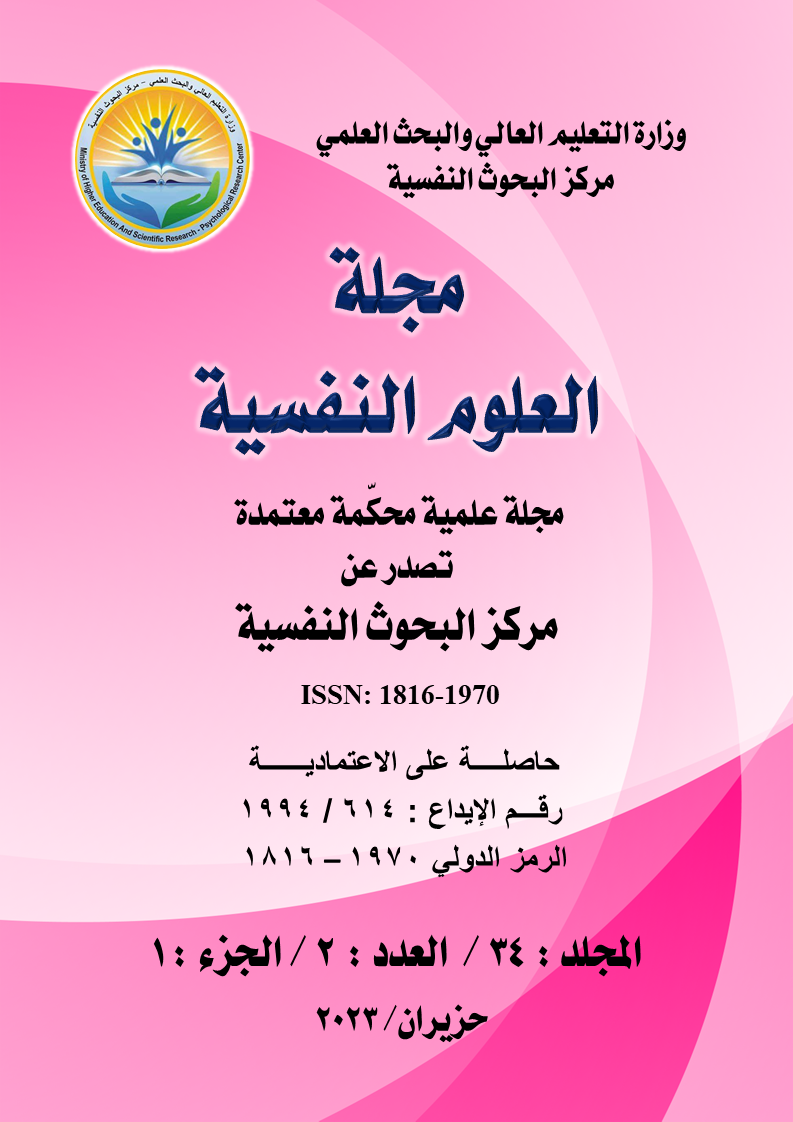Abstract
Abstract:
The study aimed to measure the self-motivation of Baghdad University students, and the statistically significant differences in self-motivation according to the variables of gender (male, female) and specialization (scientific, humanity).
The researcher built a measure of self-motivation and the number of its paragraphs was (27) items, and the psychometric characteristics were extracted from the validity and reliability of the scale. The study was applied to a sample of (400) male and female students from the University of Baghdad.
The results showed that the research sample has high self-motivation, and there are no statistically significant differences in self-motivation according to the gender variable (male, female), as well as according to specialization (scientific, humanity).
According to the results, the researcher has set forward several recommendations and suggestions.
The study aimed to measure the self-motivation of Baghdad University students, and the statistically significant differences in self-motivation according to the variables of gender (male, female) and specialization (scientific, humanity).
The researcher built a measure of self-motivation and the number of its paragraphs was (27) items, and the psychometric characteristics were extracted from the validity and reliability of the scale. The study was applied to a sample of (400) male and female students from the University of Baghdad.
The results showed that the research sample has high self-motivation, and there are no statistically significant differences in self-motivation according to the gender variable (male, female), as well as according to specialization (scientific, humanity).
According to the results, the researcher has set forward several recommendations and suggestions.
Abstract
المستخلص:
هدفت الدراسة الى قياس التحفيز الذاتي لدى طلبة جامعة بغداد , والفروق ذات الدلالة الاحصائية في التحفيز الذاتي على وفق متغيري النوع (ذكر, انثى) والتخصص (علمي, انساني).
قامت الباحثة ببناء مقياس التحفيز الذاتي وكان عدد فقراته (27) فقرة , وتم استخراج الخصائص السايكومترية من صدق وثبات للمقياس .طبقت الدراسة على عينة مكونة من (400) طالب و طالبة من طلبة جامعة بغداد.
اظهرت النتائج ان عينة البحث لديها تحفيز ذاتي عالٍ , و عدم وجود فروق ذات دلالة احصائية في التحفيز الذاتي على وفق متغير النوع (ذكر, انثى) ,وكذلك على وفق التخصص(علمي ,انساني)
وقامت الباحثة باقتراح مجموعة من المقترحات والتوصيات .
هدفت الدراسة الى قياس التحفيز الذاتي لدى طلبة جامعة بغداد , والفروق ذات الدلالة الاحصائية في التحفيز الذاتي على وفق متغيري النوع (ذكر, انثى) والتخصص (علمي, انساني).
قامت الباحثة ببناء مقياس التحفيز الذاتي وكان عدد فقراته (27) فقرة , وتم استخراج الخصائص السايكومترية من صدق وثبات للمقياس .طبقت الدراسة على عينة مكونة من (400) طالب و طالبة من طلبة جامعة بغداد.
اظهرت النتائج ان عينة البحث لديها تحفيز ذاتي عالٍ , و عدم وجود فروق ذات دلالة احصائية في التحفيز الذاتي على وفق متغير النوع (ذكر, انثى) ,وكذلك على وفق التخصص(علمي ,انساني)
وقامت الباحثة باقتراح مجموعة من المقترحات والتوصيات .
